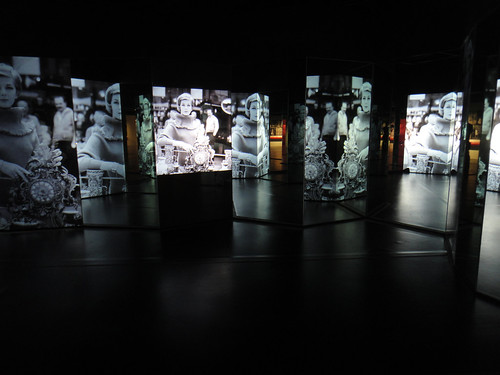Not every physical thing can be easily replaced with something digital. Your e-reader might be a great way to read things, but can the author sign your favourite book?
Before I was a web developer I worked in a bookstore, and part of the job was working at book reading and signing events with visiting authors. Even after I left the job I found myself at the signings, often as not doing some kind of odd job. Book trade has this effect, some part of you never quite leaves.
At one of those signings I met and chatted with Neil Gaiman. He signed my copy of Stardust, even though the event was actually a reading from Anansi Boys and a Mirrormask signing.
My fiancee recalls that Neil and I talked "for ages", I think he was being generous with his time as it was the last stop on a tour - the event went until after midnight!
During that chat, or maybe during his talk... he told a wonderful story about book signings. To retell it as best as I can remember...
People bring old books to signings. Books he wrote years ago, books he wrote with other authors. He said people would line up patiently, holding dogeared copies of Good Omens.
Reaching the front of the queue they'd ignore gleaming stacks of the new book, or the shiny copy in their hand and ask him to sign the old one.
They'd say defiantly, "I know it's old, and worn, and the cat chewed it and the cover's falling off... but it's my copy, I've read it over and over, this one's mine and will you sign it?"
Of course he does.
Neil tells it better, of course. I love the story because it captures part of the relationship between readers and authors; and the joy of the memento. You can be sure those battered and signed books were never flogged on eBay.
Books are more than a content delivery device. They are more than words on a page. Books are alive in ways we can feel, but struggle to explain.
A worn old book is a souvenir of its own reading... of the experience, the place it has had in someone's life. The author signing it adds to the experience already contained in the battered pages, contributing a sort of double dip to the life their creative work.
E-readers are convenient in ways that a book can never be, battery life aside, but they just lack a certain something that make them seem a little less real than the real thing.
Perhaps over time this impression will fade and we'll appreciate the pure message and story without the trappings of ink and pulp. We'll find new ways to relate to books and their authors, new rituals of appreciation and memory for the digital world.
Maybe one day we'll be able to have authors annotate ebooks with an inscription, take a stylus and scrawl on an empty page between the cover and contents.
It's important, becase we don't just read books. We need to be able to take our favourite books to have their authors sign, sketch and scrawl in them, and for us to take home and read again.
Note: I wrote a draft of this a while ago, but was reminded to finish it after finally listening to the podcast of Wrangling Time.
